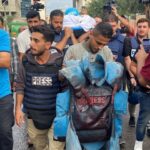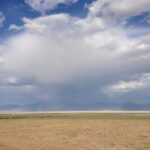Energy News Beat
Four international media outlets have denied accusations they had prior knowledge of the October 7 attacks by Hamas on southern Israel after an article by a pro-Israel media watchdog group HonestReporting questioned their work with Gaza-based freelance photojournalists.
After the publication of the article by HonestReporting, which describes itself as “a charitable organisation” with a mission to “expose anti-Israel media bias”, the Israeli government also demanded explanations from Reuters, The Associated Press, The New York Times and CNN.
list of 4 items
list 1 of 4
‘We are facing a disaster’, Mayor of Gaza’s Maghazi camp warns
list 2 of 4
How deadly is the Israel-Gaza war for journalists?
list 3 of 4
Analysis: How would Israel find, map, take and keep Gaza’s tunnels?
list 4 of 4
Israel’s war crimes in Gaza are by design, not default
end of list
In an article published on Wednesday, the website pointed out that the presence on October 7 of Gaza-based photojournalists in the border area breached by Hamas raises “serious ethical questions”. It went on to allege that their presence could have been “coordinated with Hamas” and questioned whether the news outlets “approved of their presence inside enemy territory”.
“Reuters categorically denies that it had prior knowledge of the attack or that we embedded journalists with Hamas on October 7,” Reuters said, responding to the article and subsequent allegations by Israeli government officials.
“Reuters acquired photographs from two Gaza-based freelance photographers who were at the border on the morning of October 7, with whom it did not have a prior relationship,” it said.
“The photographs published by Reuters were taken two hours after Hamas fired rockets across southern Israel and more than 45 minutes after Israel said gunmen had crossed the border. Reuters staff journalists were not on the ground at the locations referred to in the HonestReporting article,” Reuters added.
More than 1,400 people, most of them civilians, were killed in the assault on military posts and border communities.
Since then, Israel has launched an air and ground assault on Gaza, which has so far killed at least 10,812 Palestinians, including more than 4,400 children.
Israeli government spokesperson Nitzan Chen said in a statement that Israel was demanding explanations from the four news outlets regarding the HonestReporting article, saying what the report had described “crosses every red line, professional and moral”.
The AP also rejected allegations that its newsroom had prior knowledge of the attacks.
“The first pictures AP received from any freelancer show they were taken more than an hour after the attacks began. No AP staff were at the border at the time of the attacks, nor did any AP staffer cross the border at any time,” a statement said.
“The role of the AP is to gather information on breaking news events around the world, wherever they happen, even when those events are horrific and cause mass casualties.”
The news agency also said it was “no longer working” with photographer Hassan Eslaiah, one of the four photographers who documented the attacks.
CNN has also cut ties with the photographer, who was pictured in a photograph alongside Hamas leader Yahya Sinwar.
In a tweet on Thursday, HonestReporting said it was not accusing Reuters of collusion but had raised “some serious ethical issues regarding news outlets’ association with these freelancers and asked important and relevant questions that everyone deserves answers to”.
Backlash from officials
Israeli Prime Minister Benjamin Netanyahu’s office said it viewed with “utmost gravity” the suggestion that journalists working with international media had joined in covering the Hamas attacks.
“These journalists were accomplices in crimes against humanity; their actions were contrary to professional ethics,” it said.
Former Israeli ambassador to the UN Danny Danon went further and called on the four photojournalists to be added to the list “of participants to the October 7 massacre” to be “eliminated” by Israel’s security services.
The New York Times, which works with Yousef Masoud, another of the four photojournalists, called the accusations that its newsroom had advance knowledge of the attacks “untrue and outrageous”.
“We also want to speak in defense of freelance photojournalists working in conflict areas, whose jobs often require them to rush into danger to provide first-hand witness accounts and to document important news. This is the essential role of a free press in wartime,” a statement by the newspaper said.
“We are gravely concerned that unsupported accusations and threats to freelancers endangers them and undermines work that serves the public interest,” it added.
Two outlets cut ties with a Gaza-based photojournalist after pro-Israel site accuses them of prior knowledge.
ENB Top News
ENB
Energy Dashboard
ENB Podcast
ENB Substack
The post News organisations reject allegations of complicity in October 7 attacks appeared first on Energy News Beat.








